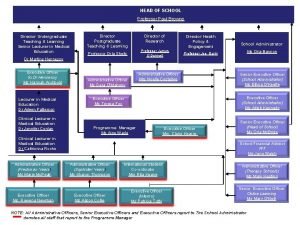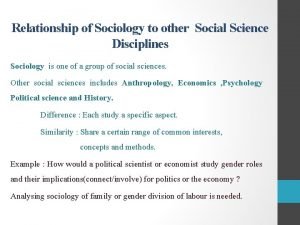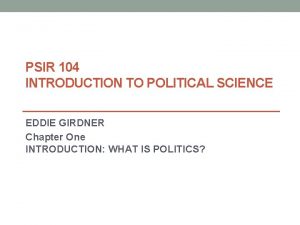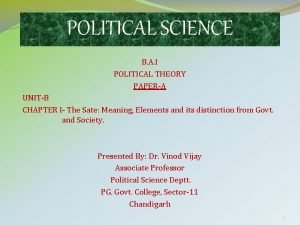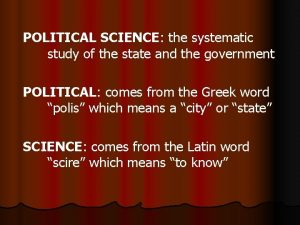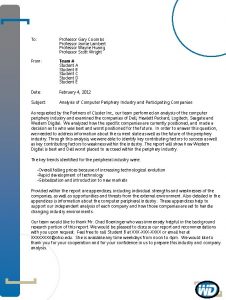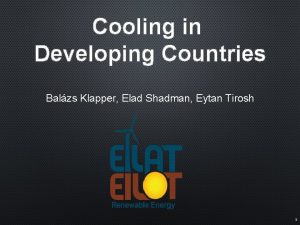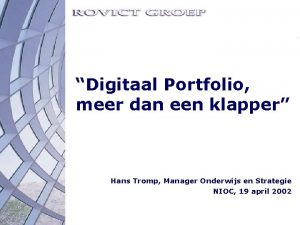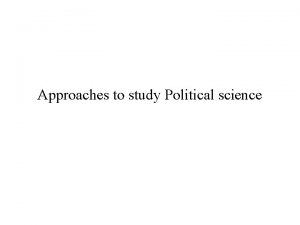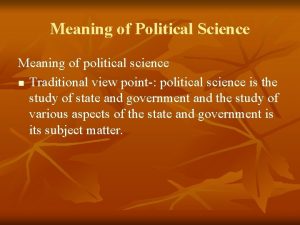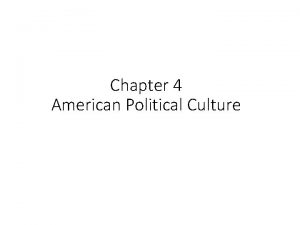Gary Herrigel Paul Klapper Professor of Political Science















- Slides: 15

Gary Herrigel Paul Klapper Professor of Political Science and the College

National Models and Industrial Change: Norwegian and German Examples Gary Herrigel Department of Political Science

National Models in Political Economy: What Are They? -Conceptual Tools Historically Specific Intended to capture specific system dynamics Social Models Industrial/Production Models Regulatory Models -Generally Focused on Institutions and their Interrelations Highlights central social groupings Complementarity -Not intrinsically bad Focus attention on crucial relations and dynamics in the political economy Can be static and overly focused on reproduction Blindsided by change Department of Political Science

Norwegian and German Examples • Post War Models of Regulation and Production very Hierarchical and Centralized Focused on Large Centralized Vertically Integrated Firms Industrial Relations Codetermination Industrial Policy Regulation National Players with Focus on Exports Department of Political Science

Generic Problem for National Industrial Models: Uncertainty, Globalization, Disintegration -Hierarchical Models are destabilized by contextual change -Growing global competition pushes technological and product change -Pressures for innovation & flexibility -Uncertainty -Growth of Emerging Markets (Brics) -Demand Growth higher abroad than at home -Increasingly can’t be serviced by exports -Producer Responses: -Disintegration of Production -Global Production (Produce where you sell) -Emergence of new practices and forms of governance outside of arrangements that defined old models -Need for dynamic theories of social process and recomposition Department of Political Science

Norwegian Case: HSE Regulation in North Sea • Norwegian Oil Production on North Sea Shelf • Exemplary System increasingly unsuited to contemporary dynamics • Norwegian Political Economy: • • • Hierarchical system, Historically very successful, Moving fitfully toward disintegration and collaboration • Players Regulator: PSA Platforms: Floating global supply chains– operators and service providers Trade Associations and Unions. Norwegian Tripartism Department of Political Science

Norwegian Case: Old model a product of specific historical circumstances • Early success with hierarchy • • • Developmental state/infant industry program Statoil Homegrown suppliers Technology policy Command Control Regulatory Regime • Shift to Functional Regulation: PSA • • • Demonstration effects: Alexander L. Kielland accident (123 deaths) 1980 Strict Operator Liability: Internal Control Indirect Safety System Monitoring: Acknowledgement of Compliance (AOC) • Tripartism-Norwegian model of cooperation • • • Safety Forum Working together for safety NOG- RNNP Data Base Department of Political Science

Norwegian Case: Shifting Conditions Undermine Old Model • Limits of Norwegian Model: Despite lack of rig disasters, limited diffusion of best practice across players; no learning • PSA: Bilateral Focus Ex ante but not ex post concerns Focus on risk rather than uncertainty • Tripartite Organs Confusion of increased personal safety with catastrophic risk reduction Political rigidity: Focus on role division rather than joint responsibility • Industry Excessive Hierarchy: Dominance of Statoil Pillarization of jobs and knowledge Low levels of cooperation Blocked innovation • Troubling Near Miss Accidents: Snorre A-Gullfaks C • Indicative of underlying problems Department of Political Science

Norwegian Case: • Movements toward change Informal Adjustments Outside Old Model • Regulation Side: movement toward incident reporting Hydrocarbon Leaks Project Drilling Managers Forum Well Life-Cycle Incident Reporting System Key: All organized outside existing system Employers Association supports groups Unions and PSA not involved • Notable Features Inclusion of all stakeholders within firms and across supply chain Ex post monitoring in addition to ex ante. Recursive learning and optimization Improved reporting and more precise categories of analysis. Makes visible variation in individual firm performance (placing pressure on laggards • Industrial actors (firms) moving toward the normalization of informal new practices: New Consortia Recursive contracting Greater Trust/Cooperation Internal control systems focused on learning Department of Political Science

Norwegian Case: Not Yet A New Model • Continuing limits • All systems are voluntary • Limits coverage • PSA reluctant to move away from internal control and actively diffuse best practice • • Participation in new groups would involve explicit role change Tripartite rigidities NOG: concerned about overstepping its role Unions: focus on personal safety has great legitimacy; focus on system loses oppositional role • New system visible, but not yet in place • Problem of political imagination Department of Political Science

German Case: Traditional Model: Exports, quality, cooperation, skill and state support for domestic innovation Traditional German Production Model -Exports -High quality products Compete on quality not on price -Cooperative industrial relations -Skilled workers -Codetermination (works councils) -Industry focus -Industrial policy & training infrastructure -reproduce skilled worker cohorts -support innovation in firms Department of Political Science

German Case: Traditional Model Confronts Disintegration and Globalization Re-allocation of competences More production in foreign markets relative to home/European markets Localization of design, production and sourcing Shrinkage of production workforce in home market Servicing of more slowly growing demand Continued linkage of production & product development Despite global reallocation of competences, production viewed as indispensible contributor to value creation Expansion of technician and engineering workforce in home market Global product development Global product adaptation support Home market product development Department of Political Science

German Case: General questions regarding Co-determination and Industrial Relations � What is the relationship between emergent recombinant stakeholder representation and pre-existing class based stakeholder/co-determination conceptions/institutions? � The former transgress, the latter entrench the property boundaries � The former continuously recast roles, the latter protects them Works councils and Corporate Production Systems To participate or not participate? Yes: new role for old actor No: risk being sidelined by emergent new system Union strategies for dealing with upgraded German workforces Engineers and designers in IG Metall? Confine focus to shrinking skilled worker base? Problem of part time & contract work: Flexibility But acceptance and even management of labor market segmentation Department of Political Science

German Case: Changing role for state No settled practice -General Questions for Regional Industrial Policy -Taking globalization seriously: Policies for supporting the new global practice rather than retaining the practices that are increasingly being abandoned -Questions of stakeholder involvement in regional upgrading -How to incorporate new players? Eg: Producers not part of collective agreements Department of Political Science

German Case: No settled practice -No New Model Open Questions regarding role changes for traditional actors Unions Works councils Industrial Policy -Need for theory focused on process, relationality Role and identity change is key Department of Political Science
 Joseph klapper theory
Joseph klapper theory Promotion from assistant to associate professor
Promotion from assistant to associate professor Dr paul browne
Dr paul browne Why science is your favourite subject
Why science is your favourite subject Uml political science
Uml political science Cyrus masroori
Cyrus masroori Social science and sociology
Social science and sociology Relationship between political science and social work
Relationship between political science and social work Relation of political science with history
Relation of political science with history Branches of political science
Branches of political science Relation between sociology and political science
Relation between sociology and political science Political science and history relationship
Political science and history relationship Fbla political science practice test
Fbla political science practice test Warsaw university political science
Warsaw university political science Qualitative analysis political science
Qualitative analysis political science It is the systematic study of the state and government
It is the systematic study of the state and government


